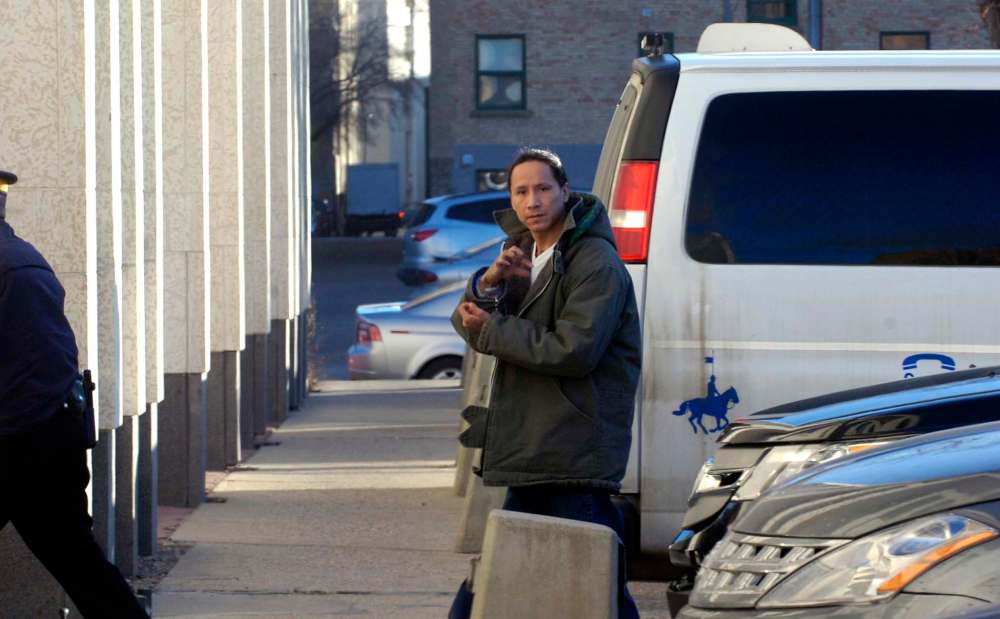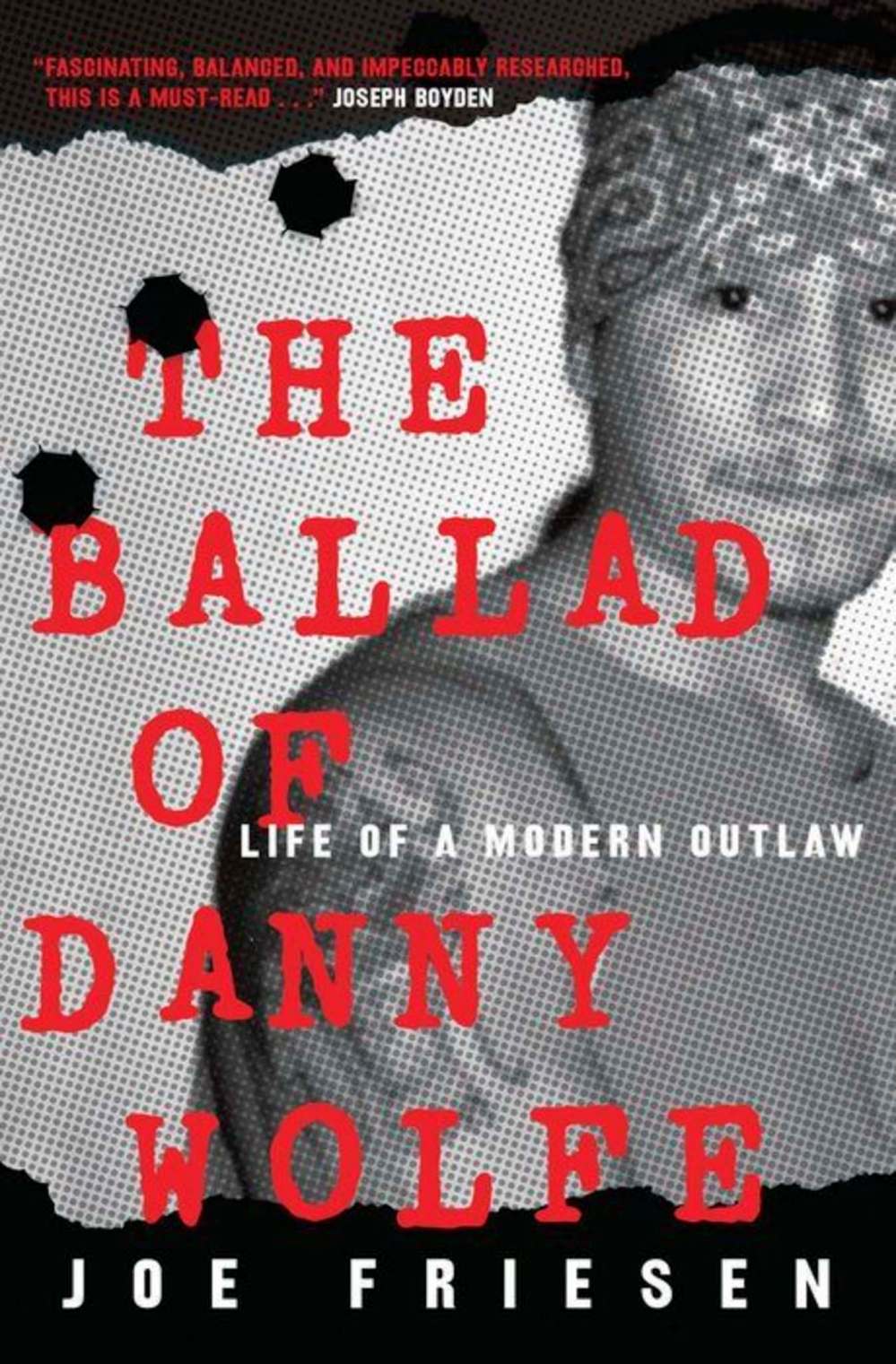Prairie gangster
Riveting reporting drives story of Indian Posse co-founder Danny Wolfe
Advertisement
Read this article for free:
or
Already have an account? Log in here »
To continue reading, please subscribe:
Monthly Digital Subscription
$1 per week for 24 weeks*
- Enjoy unlimited reading on winnipegfreepress.com
- Read the E-Edition, our digital replica newspaper
- Access News Break, our award-winning app
- Play interactive puzzles
*Billed as $4.00 plus GST every four weeks. After 24 weeks, price increases to the regular rate of $19.00 plus GST every four weeks. Offer available to new and qualified returning subscribers only. Cancel any time.
Monthly Digital Subscription
$4.75/week*
- Enjoy unlimited reading on winnipegfreepress.com
- Read the E-Edition, our digital replica newspaper
- Access News Break, our award-winning app
- Play interactive puzzles
*Billed as $19 plus GST every four weeks. Cancel any time.
To continue reading, please subscribe:
Add Free Press access to your Brandon Sun subscription for only an additional
$1 for the first 4 weeks*
*Your next subscription payment will increase by $1.00 and you will be charged $16.99 plus GST for four weeks. After four weeks, your payment will increase to $23.99 plus GST every four weeks.
Read unlimited articles for free today:
or
Already have an account? Log in here »
Hey there, time traveller!
This article was published 14/05/2016 (3444 days ago), so information in it may no longer be current.
The hardcover’s jacket features a black-and-white photograph of the hardened gangster, arm tattoos visible, hair in a ponytail, trademark bandana on display. His eyes stare into the camera, jet black, piercing, unflinching. The jacket design is completed by a flash of red, in the title text and along the spine of the book.
Red is the colour of the Indian Posse. “Red until dead,” the slogan tattooed across Danny Wolfe’s chest, is synonymous with IP, as is Danny himself, the organization’s most notorious member by the time of his 2010 death. Globe and Mail reporter Joe Friesen covered that story, following it up with a longer 2011 piece that would eventually turn into the present, highly anticipated book. Friesen followed the high-ranking IP leader and his ever-expanding criminal organization since his first years on the crime beat, and he has quite a tale to tell.
The Ballad of Danny Wolfe is very much a Prairie story, and understanding Wolfe, IP and indigenous street gangs in general means understanding the West, particular Manitoba and Saskatchewan: our small towns, life on “the Rez,” the history of colonialism and residential schools, modern racial tensions, and the unique way these cultural strands all play out in Winnipeg’s core, IP’s birthplace.

Fortunately, Friesen has the bona fides to pull it off. His parents are both professors of history at the University of Manitoba. Gerald Friesen is an expert on Western Canada and Manitoba ethnography; Jean Friesen teaches courses in aboriginal history, and is a former NDP MLA and deputy premier of Manitoba. Joe followed suit in his journalistic career, taking on the role of Prairie bureau chief in Winnipeg at the height of the Indian Posse’s reign.
This isn’t just a story about Danny Wolfe, or the Indian Posse. It’s a story about all of us. The Ballad of Danny Wolfe is like a history lesson on 20-odd years of Winnipeg’s core area, local and provincial politics, the justice system, the Winnipeg Police Service and Canadian organized crime. Former mayors, police chiefs and RCMP officers also feature throughout alongside the many high-profile IP members and their rivals.
The book is unflinching and well-balanced — factual long-form journalism at its best. Extensive interviews with family and friends both inside and outside the gang, police officers, court documents, and even genealogical research reveal the internal and external forces Danny was subject to throughout his life. The need for not only protection but a sense of belonging and love led the 12-year-old Danny and his older brother Richard to create the gang, which they referred to as a family throughout their lives.
Danny Wolfe and his fellow novice gangbangers looked to African-American street gangs in Los Angeles and other cities, as represented in Hollywood movies and hip-hop albums, for inspiration in those early years. But despite these adopted gang-life trappings, Danny in particular wanted to take back what was stolen: economic opportunity, respect in the larger society, power and influence, and especially cultural teachings and history, which he lapped up greedily at every opportunity.
Danny isn’t a hero, even in his own book. He liked to imagine himself as a rebel leader, standing up for his people against an indifferent ruling class, but rarely followed through with his best intentions. Despite his legitimate insights into the social problems surrounding him, he victimized his fellow indigenous people as much as almost anyone. He was uncomfortable with prostitution but ran prostitution rings anyway. In a letter, he made a rather oblivious comment about how the old community had declined, blaming it on cocaine without acknowledging the Indian Posse as the leading supplier.

But Danny isn’t entirely a villain either. He suffered extreme neglect and abuse, was a probable victim of fetal alcohol poisoning — likely contributing to his impulse-control issues — and was frequently malnourished from a young age. There’s a sense of inevitability to his life that makes those youths in similar circumstances managing to avoid gang life seem like a miraculous exception. AMC’s Breaking Bad won multiple Emmys in portraying a middle-class suburbanite quitting his teaching job to become a drug kingpin, but criminal organizations don’t come from suburbia or mid-life crises.
Today, indigenous leaders, educators, social workers, politicians and the justice system are all working to a greater or lesser extent to offer young people better options than Danny had. Cultural teachings such as the Sacred Circle are a mainstay in youth centres, inner-city schools, and government agencies. But some version of these cultural teachings are also in the gangs.
It’s a question of who can use them better in a battle for these kids’ souls.
Joel Boyce is a Winnipeg writer and educator.
Joe Friesen talks about his book today at 3 p.m. at Manitoba Place as part of the Spur festival. Tickets are available at spurfestival.ca or at the door.
History
Updated on Saturday, May 14, 2016 8:53 AM CDT: Photos reordered.




